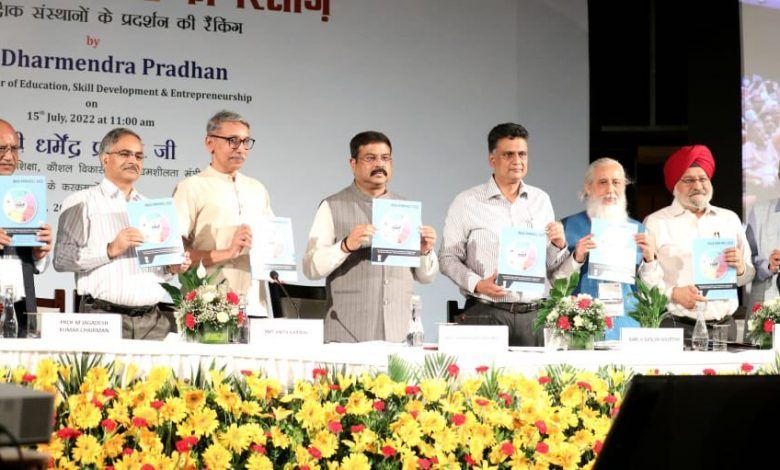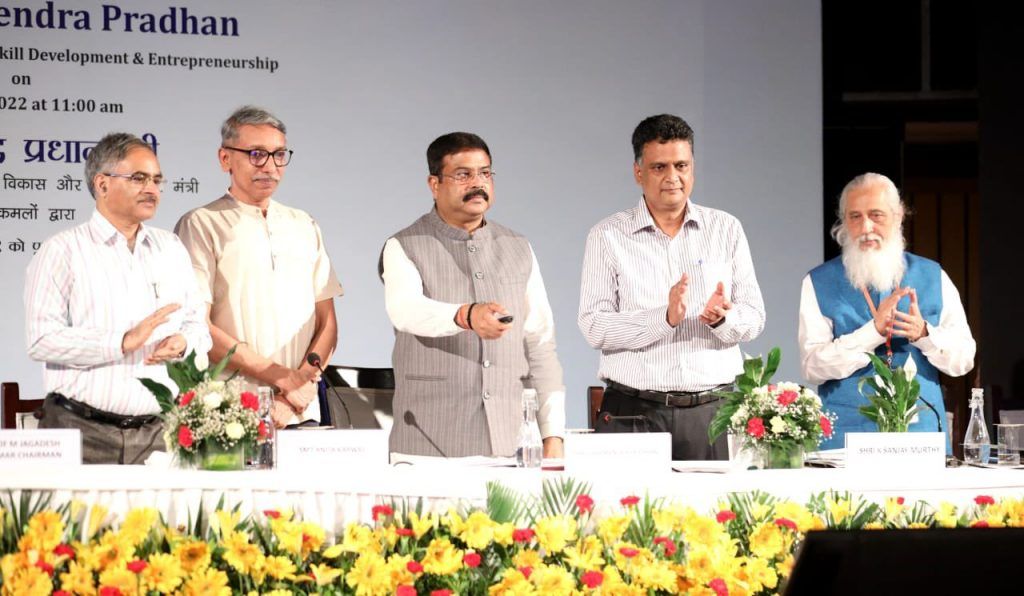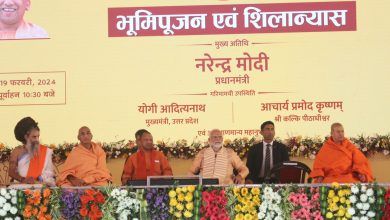
New Delhi : The Union Minister Education, Skill Development and Entrepreneurship, Dharmendra Pradhan released the India Rankings 2022 here today. Speaking on the occasion, Pradhan said that our HEIs are working towards making our education ecosystem more vibrant and making our youth future ready. A robust and objective framework for assessment, accreditation and ranking will play a major role in enhancing quality in the higher education ecosystem, he added.
The Minister further said that we are moving towards creating a knowledge-based economy which is innovation-led and technology-driven. Our higher educational institutions have to play a key role in making India a leading global innovation and digital economy and making quality education affordable and accessible for the bottom of the pyramid population, he added.
The Minister also highlighted following points:
- Accreditation and assessment shall be mandatory, and every Higher Education Institution need to be accredited. Self-declaration and transparency shall be basis of assessment and accreditation.
- All the institutions shall also be part of NIRF ranking system.
- By next year we will unify institutional accreditation presently are done by NAAC and programme accreditation presently being done by NBA. Ranking on Innovation done earlier by AICTE will henceforth integrated with NIRF. All institutions will be a part of the combined system of assessment, accreditation and rankings. Such a system will be transparent and objective.
- From next year NIRF ranking categories will also include Innovation and Entrepreneurship. NIRF rankings categories can be increased as per the needs.
- There is already work going on rankings of ITIs and Polytechnics.
- Soon there will be a system where each school is also accredited. We will take state governments on board. Parents will know the standing of school where the child is being admitted.
- Only those Universities/Colleges which have NAAC grading or NIRF ranking will be eligible for inclusion in the list maintained by the UGC under Section 12 B of the UGC Act, 1956 for receiving financial assistance.
- Our accreditation and rankings system will also become international and invite foreign institutions to be a part of it.
- CUET is a step in right direction towards quality and standardization. Any remaining challenge in CUET will be resolved at the earliest.
- Several Private Higher Education Institutions apply some affirmative action or reservation policy. All private HEIs shall move in that direction to ensure inclusive education and comply with NEP 2020 principles.
- Institutions shall become multi-disciplinary. IITs coming in top 10 in management category shows that market also desires multi-disciplinary education and institutions.

Five Broad Categories of Parameters and Weightage
The National Institutional Ranking Framework (NIRF), launched in November 2015 by the Ministry of Education, was used for this edition as well as for the past six editions of India Rankings released for the years 2016 to 2022. Five broad categories of parameters identified in the NIRF and their weightage on scale of 10 are given below:
| Sl.No. | Parameter | Marks | Weightage |
| 1 | Teaching, Learning & Resources | 100 | 0.30 |
| 2 | Research and Professional Practice | 100 | 0.30 |
| 3 | Graduation Outcomes | 100 | 0.20 |
| 4 | Outreach and Inclusivity | 100 | 0.10 |
| 5 | Perception | 100 | 0.10 |
Each of these five parameters have 2 to 5 sub-parameters. A total number of 18 – 21 sub-parameters are used for ranking of HEIs in different categories and subject domains. Institutions are ranked based on total sum of marks assigned for each of these five broad groups of parameters. In addition to parameters used for Overall category, the following two additional sub-parameters were included in methodology developed afresh for ranking institutions under “Research Institutions”: i) Research Papers published in journals covered in the First Quartile of Journal Citation Report (JCRQ1); and ii) H Index.
Besides, sourcing data on various parameters from applicant institutions, third party sources of data have also been used, wherever possible. Scopus (Elsevier Science) and Web of Science (Clarivate Analytics) were used for retrieving publications and citations data. Derwent Innovation was used for retrieving data on patents. Data retrieved from these sources was shared with the institutions for transparency with a provision to give their inputs.
Increase in Number of Applicants for India Rankings from 2016 to 2022
A total number of 4,786 unique institutions offered themselves for ranking under “Overall”, category-specific and / or domain-specific rankings for India Rankings 2022. In all, 7,254 applications for ranking were made by these 4,786 unique institutions under various categories / domains including 1,876 in Overall Category, 1,249 in Engineering, and 2,270 in General Degree Colleges. A noticeable increase in institutional participation in the rankings exercise this year indicates its recognition amongst institutions of higher education in India as a fair and transparent ranking exercise. Number of unique applicants to India Rankings have increased from 2,426 in 2016 to 4,786 in 2022 whereas total number of applications for ranking in various categories have increased from 3,565 in 2016, to 7,254 in 2022 i.e. total increase of 2,360 (97.28% increase) in unique institutions and 3,689 (103.48% increase) in total applicants.
Increase in Number of Institutions Ranked in India Rankings from 2016 to 2022
While 100 institutions are ranked in Overall, Universities and Colleges categories, number of institutions that are being ranked in Engineering has been increased to 200 from 2019 onwards. Moreover, number of institutions ranked in Management and Pharmacy are being increased from 75 to100 each from this year onwards. However, number of institutions ranked are restricted between 30 and 50 in subject domains namely Architecture, Law, Medical, Dental as well as in Research Institutions. Additional rankings are suitably bunched in Rank Bands of 101-150 and 151-200 in case of Overall, Universities and Colleges, 201-250 and 251-300 in case of Engineering and 101-125 in case of Pharmacy and Management.
Key Highlights of India Rankings 2022
- Indian Institute of Technology Madras retains its 1st position in Overall Category for fourth consecutive year and in Engineering for seventh consecutive year.
- Top 100 in Overall category consists of 40 CFTIs and CFU (including 38 technical institutions), 26 state universities, 24 deemed universities, 6 private universities, 7 medical institutions and 3 management institutions.
- Indian Institute of Science, Bengaluru tops the Universities Category for seventh consecutive year. It stood first in Research Institutions Category for second consecutive year.
- IIM Ahmedabad tops in Management subject retaining its first position for third consecutive year.
- All India Institute of Medical Sciences (AIIMS), New Delhi occupies the top slot in Medical for the fifth consecutive year. Moreover, AIIMS is ranked at 9th position in Overall category for the first time.
- Jamia Hamdard tops the ranking in Pharmacy for fourth consecutive year.
- Miranda House retains the 1st position amongst Colleges for the sixth consecutive year.
- IIT Roorkee stands at 1st position in Architecture subject for second consecutive year.
- National Law School of India University, Bengaluru retains its first position in Law for the fifth consecutive year.
- Colleges in Delhi dominate ranking of colleges with five colleges out of first 10 colleges from Delhi.
- The Saveetha Institute of Medical and Technical Sciences takes the top slot for the first time in Dental Subject displacing Manipal College of Dental Sciences, Manipal.
Click the link to see India Rankings 2022: https://www.nirfindia.org/2022/Ranking.html
K Sanjay Murthy, Secretary (HE), Anita Karwal, Secretary (SE), Prof. M Jagadesh Kumar, Chairman, UGC, Prof. Anil Sahasrabuddhe, Chairman, AICTE, Prof. K.K. Aggrawal, Dr. N.S. Kalsi, Chairman, NCVET, Prof. D.P. Saklani, Director, NCERT and Chairperson, NCTE, Secretary, School Education, and Dr. Anil Kumar Nassa, Member Secretary, NBA were present on this occasion along with vice chancellors and directors of institutions of higher education.
PIB Delhi





